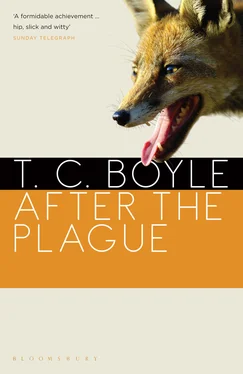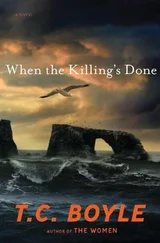I was worried. I didn’t want to let on to J.J., but I knew Bud, I knew how smooth he was — especially if you weren’t forewarned — and I knew women found him attractive. I kept thinking, What if it’s Jordy he’s after? but then I told myself the chances were pretty remote, what with a hundred and seven eager women to choose from, and even if it was — even if it was —there were still a hundred and six others and one of them had to be for me.
Statistics:
There were thirty-two women out of a population of 170 in Boynton, all of them married and all of them invisible, even when they were sitting around the bar I run in the back room of the store. Average winter temperature was minus twelve, and there was a period of nearly two months when we hardly saw the sun. Add to that the fact that seven out of ten adults in Alaska have a drinking problem, and you can imagine what life was like on the bad days.
I was no exception to the rule. The winter was long, the nights were lonely, and booze was a way to take the edge off the loneliness and the boredom that just slowed you down and slowed you down till you felt like you were barely alive. I was no drunk, don’t get me wrong — nothing like Bud Withers, not even close — and I tried to keep a check on myself, going without even so much as a whiff of the stuff every other day at least and trying my best to keep a hopeful outlook. Which is why I left the bar after two beers to go back to Peter’s place and douse myself with aftershave, solidify the hair round my bald spot with a blast of hair spray and slip into the sport coat I’d last worn at Chiz Peltz’s funeral (he froze to death the same night Bud lost his feet, and I was the one who had to pry him away from the back door of the barroom in the morning; he was like a bronze statue, huddled over the bottle with his parka pulled up over his head, and that was how we had to bury him, bottle and all). Then I made my way back through the roaring streets to the hotel and the ballroom that could have contained all of Boynton and everybody in it, feeling like an overawed freshman pressed up against the wall at the weekly social. But I wasn’t a freshman anymore, and this was no social. I was thirty-four years old and I was tired of living like a monk. I needed someone to talk to — a companion, a helpmeet, a wife — and this was my best chance of finding one.
As soon as I saw Jordy standing there by the hors d’oeuvres table, the other hundred and six women vanished from sight, and I knew I’d been fooling myself back there at the bar. She was the one, the only one, and the longing for her was a continuous ache that never let up from that moment on. She was with another woman, and they had their heads together, talking, but I couldn’t have honestly told you whether this other woman was tall or short, blond, brunette, or redhead: I saw Jordy, and nothing more. “Hi,” I said, the sport coat gouging at my underarms and clinging to my back like a living thing, “remember me?”
She sure did. And she reached up to take hold of my hand and peck a little kiss into the outer fringe of my beard. The other woman — the invisible one — faded away into the background before she could be introduced.
I found myself at a loss for what to say next. My hands felt big and cumbersome, as if they’d just been stapled on as I came through the door, and the sport coat flapped its wings and dug its talons into my neck. I wanted a drink. Badly.
“Would you like a drink?” Jordy whispered, fracturing the words into tiny little nuggets of meaning. She was holding a glass of white wine in one hand and she was wearing a pair of big glittery dangling earrings that hung all the way down to the sculpted bones of her bare shoulders.
I let her lead me up to the long folding table with the four bartenders hustling around on one side and all the women pressed up against the other while the rawboned bush crazies did their best to talk them to death, and then I had a double scotch in my hand and felt better. “It’s beautiful country,” I said, toasting her, it, the ballroom and everything beyond with a clink of our glasses, “especially out my way, in Boynton. Peaceful,” I said, “you know?”
“Oh, I know,” she said, and for the first time I noticed a hint of something barely contained bubbling just below the surface of that smoky voice, “or at least I can imagine. I mean, from what I’ve read. That’s in the Yukon watershed, isn’t it — Boynton?”
This was my cue, and I was grateful for it. I went into a rambling five-minute oration on the geographic and geological high points of the bush around Boynton, with sidelights on the local flora, fauna and human curiosities, tactfully avoiding any reference to the sobering statistics that made me question what I was doing there myself. It was a speech, all right, one that would have done any town booster proud. When I was through with it, I saw that my glass was empty and that Jordy was squirming in her boots to get a word in edgewise. “Sorry,” I said, dipping my head in apology, “I didn’t mean to talk your ear off. It’s just that”—and here I got ahead of myself, my tongue loosened by the seeping burn of the scotch—“we don’t get to talk much to anybody new, unless we make the trek into Fairbanks, and that’s pretty rare — and especially not to someone as good-looking, I mean, as attractive, as you.”
Jordy managed to flush prettily at the compliment, and then she was off on a speech of her own, decrying the lack of the human dimension in city life, the constant fuss and hurry and hassle, the bad air, the polluted beaches, and — this really got my attention — the lack of men with old-fashioned values, backbone and grit. When she delivered this last line — I don’t know if that’s how she phrased it exactly, but that was the gist of it — she leveled those glaciated eyes on me and I felt like I could walk on water.
We were standing in line at the buffet table when Bud Withers shuffled in. It was surprising how well he managed to do on those plastic feet — if you didn’t know what was wrong with him, you’d never guess. You could see something wasn’t quite right — every step he took looked like a recovery, as if he’d just been shoved from behind — but as I say, it wasn’t all that abnormal. Anyway, I maneuvered myself in between Jordy and his line of sight, hunkering over her like an eagle masking its kill, and went on with our conversation. She was curious about life in Boynton, really obsessing over the smallest details, and I’d been telling her how much freedom you have out in the bush, how you can live your life the way you want, in tune with nature instead of shut up in some stucco box next to a shopping mall. “But what about you?” she said. “Aren’t you stuck in your store?”
“I get antsy, I just close the place down for a couple days.”
She looked shocked, or maybe skeptical is a better word. “What about your customers?”
I shrugged to show her how casual everything was. “It’s not like I run the store for the public welfare,” I said, “and they do have The Nougat to drink at, Clarence Ford’s place.” (Actually, Clarence meant to call it The Nugget, but he’s a terrible speller, and I always go out of my way to give it a literal pronunciation just to irritate him.) “So anytime I want, dead of winter, whatever, I’ll just hang out the Gone Trappin’ sign, dig out my snowshoes, and go off and run my trapline.”
Jordy seemed to consider this, the hair round her temples frizzing up with the steam from the serving trays. “And what are you after—” she said finally, “mink?”
“Marten, lynx, fox, wolf.” The food was good (it ought to have been for what we were paying), and I heaped up my plate, but not so much as to make her think I was a hog or anything. There was a silence. I became aware of the music then, a Beach Boys song rendered live by a band from Juneau at the far end of the room. “With a fox,” I said, and I didn’t know whether she wanted to hear this or not, “you come up on him and he’s caught by the foot and maybe he’s tried to gnaw that foot off, and he’s snarling like a chainsaw … well, what you do is you just rap him across the snout with a stick, like this”—gesturing with my free hand—“and it knocks him right out. Like magic. Then you just put a little pressure on his throat till he stops breathing and you get a nice clean fur, you know what I mean?”
Читать дальше












